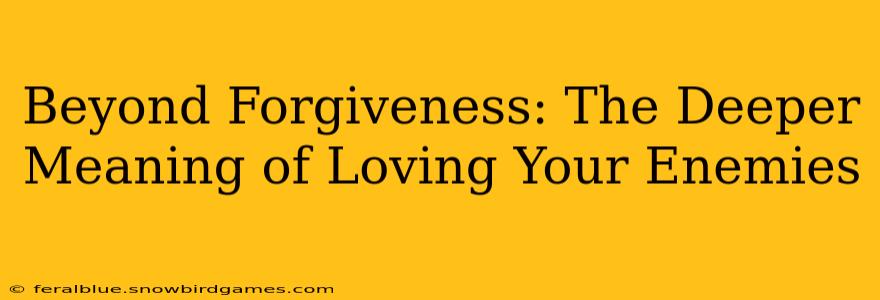The phrase "love your enemies" often evokes feelings of confusion and even resentment. How can we possibly love someone who has caused us pain, betrayal, or injustice? While forgiveness is a crucial part of the process, loving your enemies goes far beyond simply pardoning their actions. It's a transformative journey of self-discovery, emotional growth, and ultimately, finding inner peace. This isn't about condoning harmful behavior; it's about liberating yourself from the shackles of negativity and bitterness. This article will delve into the deeper meaning of this challenging yet profoundly rewarding concept.
What Does "Loving Your Enemies" Actually Mean?
The concept of loving your enemies isn't about romantic love or even necessarily liking them. It's about cultivating a mindset of compassion, empathy, and detachment from the negative emotions that their actions may have triggered in you. It's about choosing to respond to harm with understanding, rather than perpetuating the cycle of negativity. It’s about shifting your focus from the pain they caused to your own well-being and growth.
Isn't Forgiveness Enough? What's the Difference?
Forgiveness is a vital step, but it's not the end goal. Forgiveness is about releasing the anger and resentment you hold towards someone. It's about letting go of the need for revenge or retribution. Loving your enemies, however, goes further. It's about actively choosing to wish them well, even if it's difficult. It's about seeing them as human beings, capable of both good and bad, and recognizing their inherent worth, regardless of their actions towards you.
How Can I Love Someone Who Has Hurt Me?
This is arguably the most challenging aspect of loving your enemies. It requires a significant shift in perspective and a willingness to engage in self-reflection. Here are some steps to consider:
- Acknowledge your emotions: Don't suppress your anger, sadness, or hurt. Allow yourself to feel these emotions fully and without judgment.
- Understand their perspective (without excusing their actions): Try to understand the circumstances and motivations that may have led to their actions. This isn't about justifying their behavior, but about recognizing the complexities of human nature.
- Practice empathy: Put yourself in their shoes (without minimizing your own pain). Consider the factors that may have contributed to their behavior.
- Focus on self-compassion: Healing from hurt requires self-care and compassion. Prioritize your well-being.
- Practice detachment: Learn to separate yourself emotionally from the situation and the person who hurt you. This doesn't mean ignoring the situation, but it does mean not allowing it to control your emotions.
What are the Benefits of Loving Your Enemies?
The benefits of choosing to love your enemies extend far beyond simply letting go of resentment. They include:
- Reduced stress and anxiety: Holding onto anger and resentment is emotionally exhausting. Letting go can significantly improve your mental health.
- Increased emotional well-being: Focusing on compassion and understanding can lead to a more positive and fulfilling life.
- Improved relationships: While you may not necessarily reconcile with your enemy, releasing negativity can improve your relationships with others.
- Spiritual growth: Many find that embracing this principle deepens their spiritual understanding and connection.
- Greater sense of peace: By releasing the grip of negativity, you create space for inner peace and tranquility.
Is It Possible to Truly Love Someone Who Has Caused Significant Harm?
Yes, although it may seem impossible, it is possible to cultivate a compassionate mindset towards even those who have caused significant harm. Remember, this isn't about condoning their actions, but about freeing yourself from the burden of hatred and resentment. It's a process, not a destination, and requires consistent effort and self-reflection.
How Does This Relate to Forgiveness?
Forgiveness lays the groundwork for loving your enemies. Forgiveness releases you from the chains of anger and bitterness, while loving your enemies elevates you to a place of compassion and understanding. It’s a natural progression, building on the foundation of letting go of negativity. Think of forgiveness as the first step on a long journey, and loving your enemies as the eventual destination - a place of peace and inner freedom.
This journey is deeply personal and requires patience and self-compassion. Remember, it's about your own well-being and liberation, not about changing the other person. The true power lies in transforming your own heart and finding peace within yourself.

